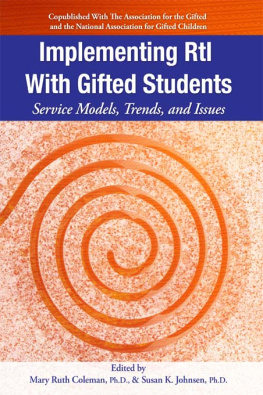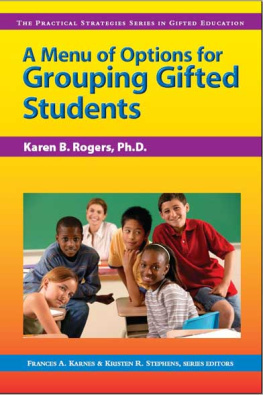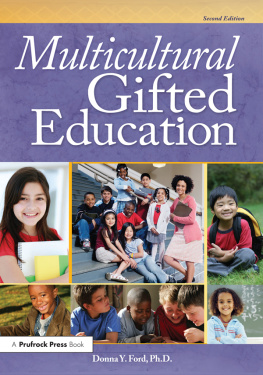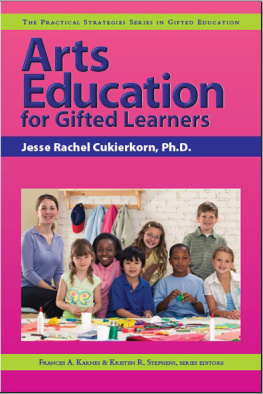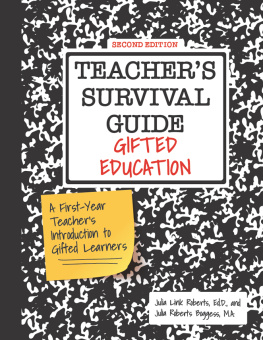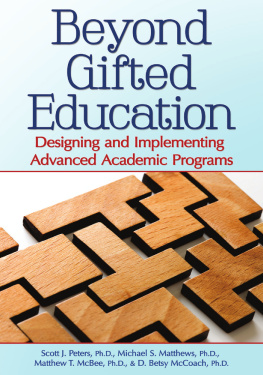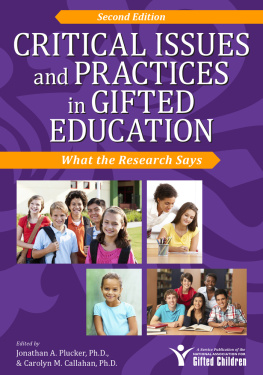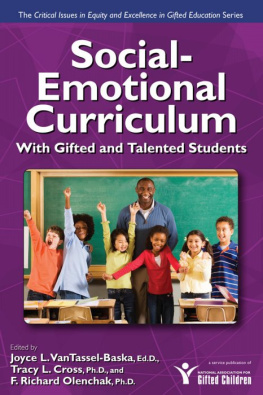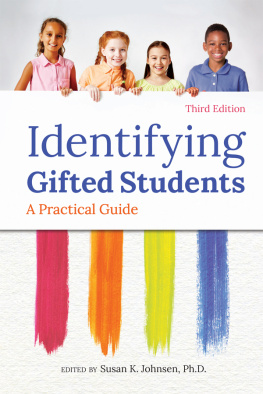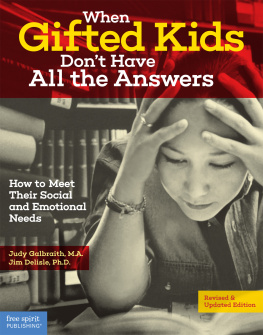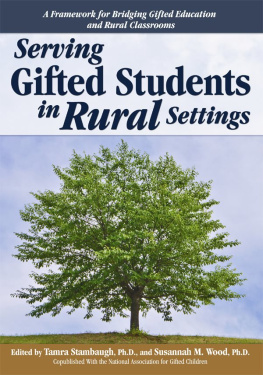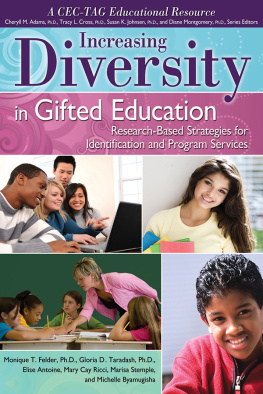ABOUT THE CONTRIBUTORS
Cheryll M. Adams, Ph.D., is Director Emerita of the Center for Gifted Studies and Talent Development at Ball State University. She has coauthored three successful Jacob K. Javits Gifted Programming Grants and serves on the editorial review boards for Roeper Review, Gifted Child Quarterly, and Journal for the Education of the Gifted.
Heidi Anwiler is a graduate student at the Center for Gifted Studies and Talent Development at Ball State University.
George T. Betts, Ed.D., is a professor of gifted education in the School of Special Education at the University of Northern Colorado. He founded and has been the director of the Summer Enrichment Program for the past 35 years. His major research areas are the social and emotional needs of gifted, talented, creative learners and the Autonomous Learner Model.
Robin Carey, Ph.D., received her doctoral degree in educational administration and policy studies from the University of Denver with her doctoral dissertation, Examining the Utility of the Response to Intervention Framework in Meeting the Needs of All Learners. Robin holds a masters degree in gifted education from the University of Northern Colorado, and a bachelors degree in music education from Concordia College, Moorhead, MN.
Laurence J. Coleman, Ph.D., is the Daso Herb Professor of Gifted Education at the University of Toledo. He is past editor of the Journal for the Education of the Gifted and has received the Distinguished Scholar Award from the National Association for Gifted Children and the Outstanding Service Award from The Association for the Gifted, a division of the Council for Exceptional Children.
Joy Lawson Davis, Ed.D., is the director of the Center for Gifted Education at the University of Louisiana at Lafayette. She has served as chair of the Diversity and Equity Committee of the National Association for Gifted Children. Dr. Davis also worked as the Virginia state gifted education K12 specialist for 5 years. She is the author of Bright, Talented, and Black: A Guide for Families of African American Gifted Learners (Great Potential Press).
Donna Y. Ford, Ph.D., is a professor of education and human development at Vanderbilt University. She has served as a researcher for the National Research Center on the Gifted and Talented and has authored more than 150 publications, including Reversing Underachievement Among Gifted Black Students (Prufrock Press).
James J. Gallagher, Ph.D., is Senior Scientist Emeritus and former director of the FPG Child Development Institute. He was instrumental in founding the North Carolina School for Science and Mathematics and has influenced gifted education policy for more than 50 years.
Nicholas W. Gelbar is a doctoral student in school psychology and gifted and talented education at the University of Connecticut. His research interests are interventions for students with learning disabilities, particularly twice-exceptional students, postsecondary education and transition for students with disabilities, and effective online education.
Claire E. Hughes, Ph.D., is an associate professor of special education at the College of Coastal Georgia. She is the chair of the Special Populations Network of the National Association for Gifted Children. Her areas of interest include twice-exceptional students, teacher preparation, and high-functioning autism.
Jennifer Job is a doctoral candidate in curriculum studies at the University of North Carolina at Chapel Hill. She has had articles published in Gifted Child Today, The National Teacher Education Journal, and The High School Journal.
Stuart Omdal, Ph.D., is a professor of gifted education at the University of Northern Colorado. His work has been featured in, among other publications, the Journal of Advanced Academics and Inquiry: Critical Thinking Across the Disciplines.
Daphne Pereles is the executive director for the Learning Supports Unit at the Colorado Department of Education. Over the course of her career, Daphne has been a teacher in gifted, special, and general education, and her work has focused on twice-exceptional students for more than 15 years. She currently directs state efforts to assist districts and schools to create educational systems that support increased student achievement for all. She has published articles in Gifted Child Today.
Sally M. Reis, Ph.D., is Vice Provost for Academic Affairs and a Board of Trustees Distinguished Professor at the University of Connecticut. She was a teacher for 15 years, 11 of which were spent working with gifted students at the elementary, junior high, and high school levels, and is a well-known researcher in the field, having authored or coauthored more than 250 articles, books, book chapters, monographs, and technical reports.
Joseph S. Renzulli, Ph.D., is a professor of educational psychology at the University of Connecticut, where he also has served as the director of The National Research Center on the Gifted and Talented for the past 21 years. His research has focused on strength-based assessment, the identification and development of creativity and giftedness in young people through personalized learning strategies, and curricular and organizational models for differentiated learning environments that contribute to total school improvement for all learners.
Ann Robinson, Ph.D., is a professor of educational psychology and the founding director of the Jodie Mahony Center for Gifted Education at the University of Arkansas at Little Rock, where she coordinates the personnel preparation programs in gifted education. She is the Immediate Past President of the National Association for Gifted Children and a former editor of Gifted Child Quarterly and has focused on intervention studies with talented learners and their teachers.
Michelle Trotman Scott, Ph.D., is an assistant professor of special education at the University of West Georgia. Her publications have appeared in multiple journals. She also has authored a chapter in Studying Diversity in Teacher Education (Rowman & Littlefield) and is a co-editor of Gifted and Advanced Black Students in School: An Anthology of Critical Works (Prufrock Press).
Sneha Shah-Coltrane is the academically and intellectually gifted consultant for the North Carolina Department of Public Instruction. She is coauthor of the U-STARS~PLUS materials with Mary Ruth Coleman.
W. Thomas Southern, Ph.D., is professor and director of gifted programs at Bowling Green State University. He is co-director of the Center for Evaluation Services at Bowling Green and coauthor of The Academic Acceleration of Gifted Children (Teachers College Press).
Mary Kathryn Stein has worked with gifted students as a parent, teacher, administrator, and education service cooperative gifted and talented specialist and is currently the gifted programs coordinator for the Arkansas Department of Education. She is working on her doctorate in gifted education at the University of Arkansas at Little Rock.
Tracey N. Sulak, Ph.D., received her doctorate in educational psychology at Baylor University. She has an M.Ed. in curriculum and instruction with an emphasis in gifted and talented education.
Joyce VanTassel-Baska, Ed.D., is the Smith Professor Emerita at The College of William and Mary in Virginia where she developed a graduate program and research center in gifted education. Formerly, she initiated and directed the Center for Talent Development at Northwestern University. She has published widely, including 27 books and more than 500 refereed journal articles, book chapters, and scholarly reports.
Nina Yssel, Ph.D.
Next page
